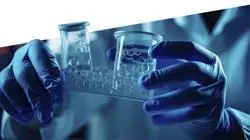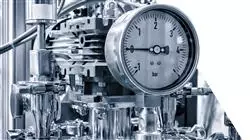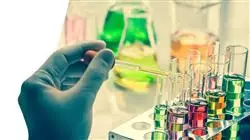University certificate
The world's largest faculty of engineering”
Introduction to the Program
Become a Postgraduate diploma in technological innovation strategies in the Chemical Industry"

Sustainability in the Chemical Industry implies the consideration of the entire life cycle of chemical products, for this reason, scientific research is focused on improving existing processes, as well as incorporating improvements that favor the care of the environment. A productive scenario thanks to the new technologies that are being implemented and the promotion of L+O+I projects in many countries around the world.
Faced with this reality, the engineer has a wide range of actions in which to promote actions aimed at promoting integrated waste management, or the implementation of useful strategies for the design and manufacture of chemical products. This 6-month Postgraduate diploma in Innovation and Sustainable Development in the Chemical Sector is in line with this line.
This is an intensive program that will allow high school students to obtain a current view on the practical application of knowledge about separation operations, or chemical reactors in real situations. In addition, it will delve into the economic and financial viability of projects within the sector, the applicable safety regulations in force, as well as all the processes involved in the creation, design, and production of chemical products.
Thanks to this approach, the graduates will have the opportunity to increase their leadership skills and competencies to successfully perform in national and international initiatives in prestigious companies within the industry. All this, with the impulse of this program that presents a 100% online methodology, flexible, whose content can be consulted 24 hours a day, from any electronic device with an internet connection.
Thanks to the 100% online methodology you can access 24 hours a day to the most advanced syllabus on L+O+I in Chemical Engineering"
This Postgraduate diploma in Innovation and Sustainable Development in Chemical Sector contains the most complete and up-to-date program on the market. The most important features include:
- The development of practical cases presented by experts in Chemistry Engineering
- The graphic, schematic, and practical contents with which they are created, provide scientific and practical information on the disciplines that are essential for professional practice
- Practical exercises where self-assessment can be used to improve learning
- Its special emphasis on innovative methodologies
- Theoretical lessons, questions to the expert, debate forums on controversial topics, and individual reflection assignments
- Content that is accessible from any fixed or portable device with an Internet connection
Access from any digital device with an Internet connection to the extensive library of teaching resources provided by this program"
The program’s teaching staff includes professionals from the industry who contribute their work experience to this program, as well as renowned specialists from leading societies and prestigious universities.
The multimedia content, developed with the latest educational technology, will provide the professional with situated and contextual learning, i.e., a simulated environment that will provide immersive education programmed to learn in real situations.
This program is designed around Problem-Based Learning, whereby the professional must try to solve the different professional practice situations that arise during the educational year. For this purpose, the students will be assisted by an innovative interactive video system created by renowned and experienced experts.
Increase your skills in planning the sustainable use of water resources"

Delves from a theoretical-practical perspective into the design of processes and chemical products in today's industry. Enroll now"
Syllabus
The syllabus of this university program contemplates an educational itinerary that will lead the engineer to be up-to-date with the processes of Innovation and Sustainable Development in the Chemical Sector. To this end, the graduates have access to multimedia teaching resources (videos in detail, video summaries), specialized readings, and case studies, accessible 24 hours a day, 7 days a week. In addition, thanks to the Relearning system, such learning will be more natural and progressive, without the need to invest many hours of study and memorization.

A syllabus that includes high-quality multimedia teaching resources, accessible 24 hours a day"
Module 1. Processes and Chemical Products Design
1.1. Chemical Products Design
1.1.1. Chemical Products Design
1.1.2. Stages in Product Design
1.1.3. Chemical Products Categories
1.2. Strategies in Chemical Products Design
1.2.1. Detection of Market Needs
1.2.2. Conversion of Requirements into Product Specifications
1.2.3. Sources of Idea Production
1.2.4. Strategies for the Idea Screening
1.2.5. Variables Influencing Idea Selection
1.3. Strategies in Chemical Products Manufacturing
1.3.1. Prototypes in Chemical Products Manufacturing
1.3.2. Chemical Products Manufacture
1.3.3. Specific Design of Basic Chemicals
1.3.4. Scaling
1.4. Process Design
1.4.1. Flowsheeting for Process Design
1.4.2. Process Understanding Diagrams
1.4.3. Heuristic Rules in the Design of Chemical Processes
1.4.4. Flexibility of Chemical Processes
1.4.5. Problem Solving Associated with Process Design
1.5. Integrated Environmental Remediation in Chemical Processes
1.5.1. Integration of the Environmental Variable in Process Engineering
1.5.2. Recirculation Flows in the Process Plant
1.5.3. Treatment of Effluents Produced in the Process
1.5.4. Minimization of Discharges from Process Plant Activities
1.6. Process Intensification
1.6.1. Intensification Applied to Chemical Processes
1.6.2. Intensification Methodologies
1.6.3. Intensification in Reaction and Separation Systems
1.6.4. Process Intensification Applications: Highly Efficient Equipment
1.7. Stock Management
1.7.1. Inventory Management
1.7.2. Selection Criteria
1.7.3. Inventory Sheets
1.7.4. Procurement
1.8. Processes and Chemical Products Economic Analysis
1.8.1. Fixed and Working Capital
1.8.2. Capital and Manufacturing Cost Estimation
1.8.3. Equipment Cost Estimate
1.8.4. Estimation of Labor and Raw Material Costs
1.9. Profitability Estimation
1.9.1. Global Investment Estimation Methods
1.9.2. Detailed Investment Estimation Methods
1.9.3. Chemical Investment Selection Criteria
1.9.4. The Time Factor in Cost Estimation
1.10. Application in the Chemistry Industry
1.10.1. Glass Industry
1.10.2. Cement Industry
1.10.3. Ceramic Industry
Module 2. Sustainability and Quality Management in Chemical Industry
2.1. Environmental Management Systems
2.1.1. Environmental Management
2.1.2. Environmental Impact Assessment
2.1.3. ISO 14001 Standard and Continuous Improvement
2.1.4. Environmental Auditing
2.2. Carbon and Environmental Footprint
2.2.1. Corporate Sustainability
2.2.2. Corporate Carbon and Environmental Footprint
2.2.3. Carbon Footprint Calculation of an Organization
2.2.4. Application of the Corporate Environmental Footprint
2.3. Sustainable Water Management in Industry
2.3.1. Planning the Sustainable Use of Water Resources through Hydrological Modeling
2.3.2. Responsible Use of Water in Industrial Chemical Processes
2.3.3. Use of Nature-Based Solutions in Industry
2.4. Life Cycle Analysis
2.4.1. Sustainable Industrial Production
2.4.2. Product Life Cycle Components
2.4.3. Phases of the Life Cycle Analysis Methodology
2.4.4. ISO 14040 Standard for Product Life Cycle Assessment
2.5. Quality Management Systems
2.5.1. Quality Principles and Evolution
2.5.2. Quality Control and Assurance
2.5.3. ISO 9001
2.6. Process Quality Assurance
2.6.1. Quality Management Systems and Its Processes
2.6.2. Steps in the Quality Assurance Process
2.6.3. Standardized Processes
2.7. Quality Assurance of the Final Product
2.7.1. Standardization
2.7.2. Equipment Calibration and Maintenance
2.7.3. Product Approvals and Certifications
2.8. Implantation of Integrated Management System
2.8.1. Integrated Management System
2.8.2. Implantation of Integrated Management System
2.8.3. GAP Analysis
2.9. Change Management in the Chemical Industry
2.9.1. Change Management in the Industry
2.9.2. Industry of Chemical Processes
2.9.3. Change Planning
2.10. Sustainability and Minimization: Integrated Waste Management
2.10.1. Minimization of Industrial Waste
2.10.2. Stages in the Minimization of Industrial Waste
2.10.3. Recycling and Treatment of Industrial Waste
Module 3. L+O+I in Chemical Engineering
3.1. L+O+I Chemical Engineering
3.1.1. Scientific Methodology Applied to Investigation
3.1.2. Factorial Design of Experiments
3.1.3. Empirical Modeling
3.1.4. Scientific Writing Strategies
3.2. Technological Innovation Strategies in the Chemical Industry: Innovation and Creativity
3.2.1. Innovation in the Chemical Industry
3.2.2. Creative Process
3.2.3. Creativity Facilitating Techniques
3.3. Innovation in Chemical Engineering
3.3.1. Taxonomy of Innovation
3.3.2. Types of Innovation
3.3.3. Dissemination of Innovation
3.3.4. ISO 56000 Standard / ISO 166000 Terminology
3.4. Marketing of Innovation
3.4.1. Differentiation and Positioning Strategies in Chemical Engineering
3.4.2. Communication Management in Innovative Chemical Engineering
3.4.3. Ethics in Chemical Engineering Innovation Marketing
3.5. Databases and Bibliographic Management Software
3.5.1. Scopus
3.5.2. Web of Science
3.5.3. Scholar Google
3.5.4. Bibliographic Management with Mendeley
3.5.5. Bibliographic Management with EndNote
3.5.6. Bibliographic Management with Zotero
3.5.7. Patent Search in Databases
3.6. International Research Funding Programs
3.6.1. Application for L+O+I projects
3.6.2. Marie-Curie Research Fellowship Program
3.6.3. International Research Funding Collaborations
3.7. Management of the Protection and Exploitation of L+O+I Results
3.7.1. Intellectual Property
3.7.2. Patents
3.7.3. Industrial Property
3.8. Tools for the Communication of L+O+I Results
3.8.1. Scientific Events
3.8.2. Scientific Articles and Reviews
3.8.3. Scientific Dissemination
3.9. Research Career in Chemical Engineering
3.9.1. Researcher in Chemical Engineering Professional Background and Education
3.9.2. Chemical Engineering Advances
3.9.3. Responsibility and Ethics in a Research Career in Chemical Engineering
3.10. Transfer of Results and Technology between Research Centers and Companies
3.10.1. Interaction of Participants and Dynamics of Technology Transfer
3.10.2. Technology Monitoring
3.10.3. University-Business Projects
3.10.4. Spin-off Companies
Module 4. Organization and Management of Companies in Chemical Sector
4.1. RRHH Management in the Chemical Sector
4.1.1. Human Resources
4.1.1.1. Formation and Motivation of the Human Team in the Chemical Sector
4.1.2. Job Analysis: Group Organization
4.1.3. Payroll and Incentives
4.2. Organization of Work in the Chemical Sector
4.2.1. Work Planning: Taylor's Organizational Theory
4.2.2. Personal Recruitment in the Chemical Sector
4.2.3. Organization of the Work Team
4.2.4. Teamwork Techniques
4.3. Organization of the Company
4.3.1. Elements in the Organization of the Company
4.3.2. Organizational Structure in the Chemical Industry
4.3.3. Division of Labor
4.4. Chemical Production Management and Organization
4.4.1. Strategic Decisions in Chemical Production
4.4.2. Production Planning
4.4.3. Theory of the Limitations
4.4.4. Short-Term Programming
4.5. Financial Business Management
4.5.1. Financial Planning
4.5.2. Company Valuation Methods
4.5.3. The Investment: Static and Dynamic Inversion Methods
4.6. Development of Manager Skills
4.6.1. Creative Problem Solving
4.6.2. Corporate Conflict Management
4.6.3. Empowerment and Delegation: Pyramidal Structure
4.6.4. Formation of Efficient Teams
4.7. Business Plan
4.7.1. Legal-Fiscal Plan
4.7.2. Operational Plan
4.7.3. Marketing Plan
4.7.4. Economic-Financial Plan
4.8. Business and Corporate Social Responsibility
4.8.1. Governance in RSE and RSC
4.8.2. Criteria for the Analysis of RSC in the Chemical Industry
4.8.3. RSE and CSR Implications
4.9. International Agreements in the Chemical Sector
4.9.1. Rotterdam Convention on the Export and Import of Hazardous Chemicals
4.9.2. Chemical Weapons Convention
4.9.3. Stockholm Convention on Persistent Organic Pollutants
4.9.4. Strategic International Chemicals Management Agreement
4.10. Ethical Controversies in the Chemical Industry
4.10.1. Environmental Challenges
4.10.2. Distribution and Use of Natural Resources
4.10.3. Implications of Negative Ethics

Make the most of this opportunity to learn about the latest advances in this subject to apply it to your daily practice"
Postgraduate Diploma in Innovation and Sustainable Development in the Chemical Sector.
Are you ready to take a step forward in your career and become an expert in innovation and sustainable development in the chemical sector? The Faculty of Engineering at TECH Global University provides you with an exceptional opportunity to achieve your career goals through the online mode program. Our Faculty, recognized for its academic excellence and commitment to innovation, is proud to offer this unique degree that will allow you to explore in depth the complexities and challenges of the chemical sector in a world increasingly focused on sustainability. What skills will you acquire by completing this program? From learning to master the latest trends in chemistry, to developing innovative strategies to promote environmental responsibility in the industry, you'll be prepared to lead change in your field. Here, we have a team of highly qualified and experienced faculty who will guide you through every step of the learning process. You'll learn from experts who are at the forefront of research and practice in the chemical industry, giving you a unique and valuable perspective.
Acquire knowledge in this growing area
In this program, you will explore crucial topics such as eco-efficiency in chemical production, waste management and process optimization, among others. In addition, you will have access to cutting-edge resources and tools that will enrich your learning experience. Studying at TECH is an unparalleled opportunity. Our institution stands out for its commitment to academic excellence, cutting-edge research and the specialization of highly trained professionals. Thus, upon completion, you will receive a recognized certificate that will open doors to a variety of career opportunities. You will be able to work in key roles in chemical companies, government agencies, non-profit organizations and more, playing a key role in building a more sustainable world. Enroll now in the Postgraduate Diploma in Innovation and Sustainable Development in the Chemical Sector and prepare yourself for a future full of possibilities and achievements!







